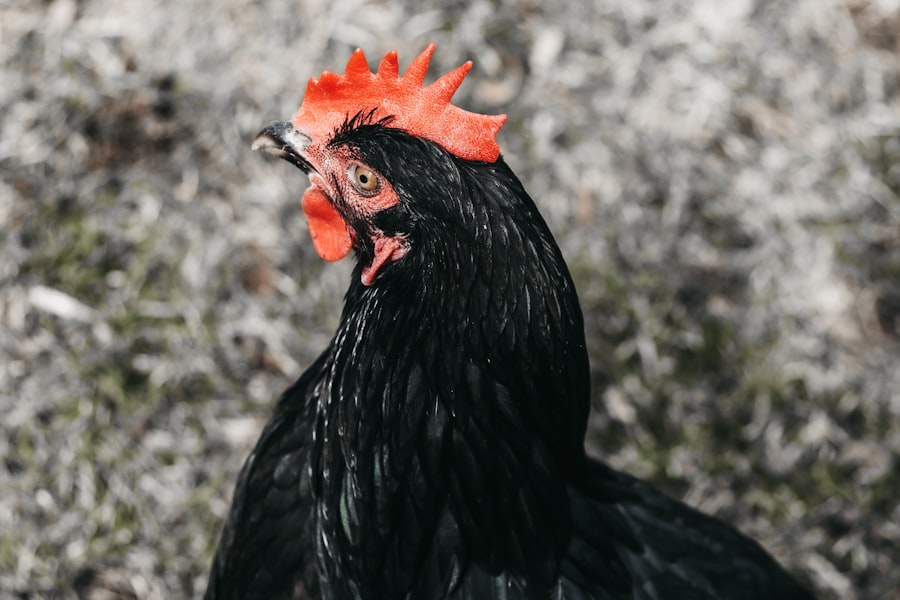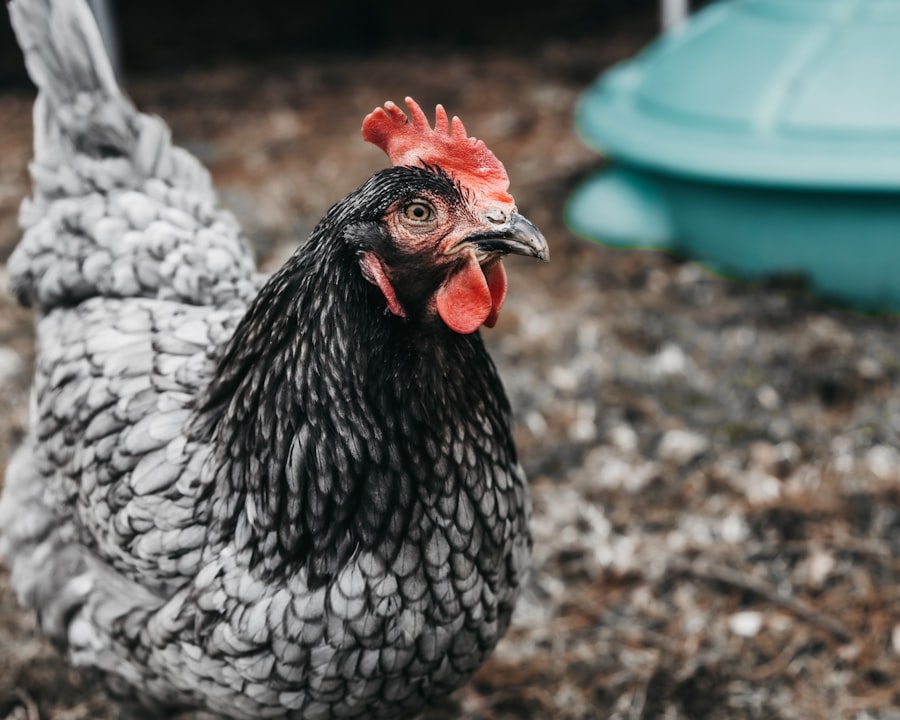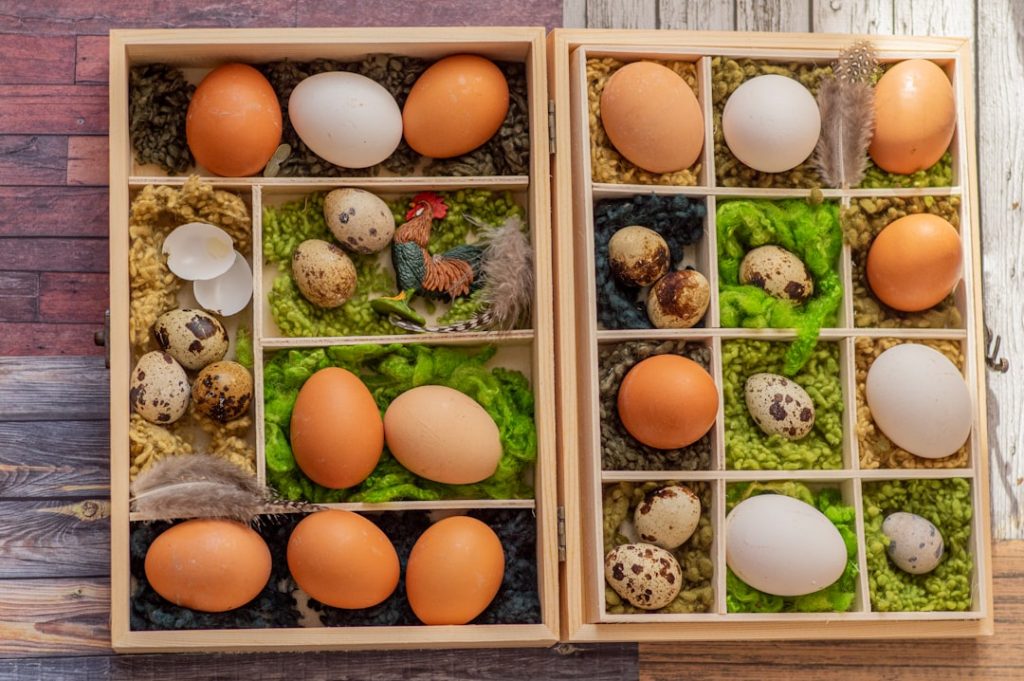When selecting chicken breeds for a backyard flock, it is essential to consider various factors. There are numerous chicken breeds available, each with distinct characteristics. Some breeds excel in egg production, while others are better suited for meat.
Climate adaptability is another important consideration, as certain breeds are more tolerant of cold or warm environments. For those primarily interested in egg production, breeds such as Rhode Island Red, Leghorn, and Australorp are popular choices due to their high laying capacity. Dual-purpose breeds like Plymouth Rock, Orpington, and Sussex provide both eggs and meat, and are known for their friendly nature, making them suitable for small backyard settings.
In colder climates, breeds like Wyandotte or Brahma are recommended for their thick feathers and cold tolerance. When choosing a breed, it is important to consider the bird’s size and temperament. Some breeds are more docile and friendly, making them ideal for families with children or novice chicken keepers.
Others may be more skittish or aggressive, which could present challenges in a backyard environment. The size of the bird should also be taken into account in relation to the available space, as larger breeds typically require more room to roam than smaller ones. By carefully evaluating these factors, chicken owners can select breeds that are well-suited to their specific requirements and will thrive in their backyard flock.
Table of Contents
- 1 Housing and Coop Design
- 2 Feeding and Nutrition
- 3 Health and Disease Management
- 4 Egg Production and Care
- 5 Behavior and Socialization
- 6 Legal Considerations and Regulations
- 7 FAQs
- 7.1 What are the basic requirements for keeping chickens?
- 7.2 What should I consider when choosing a chicken coop?
- 7.3 What do chickens eat and drink?
- 7.4 How do I protect my chickens from predators?
- 7.5 What are some common health issues in chickens?
- 7.6 How do I care for chicken eggs?
- 7.7 What are some benefits of keeping chickens?
Key Takeaways
- Consider the climate, space, and purpose of raising chickens when choosing the right breed
- Provide a secure and well-ventilated coop with nesting boxes and perches for housing and coop design
- Offer a balanced diet with access to fresh water and occasional treats for feeding and nutrition
- Regularly monitor and maintain the health of chickens to prevent and manage diseases
- Collect and store eggs properly, and provide proper care for the overall well-being of the chickens
Housing and Coop Design
Coop Size and Space Requirements
When designing your coop, it’s essential to consider the size of your flock and provide adequate space for your chickens to move around comfortably. A general rule of thumb is to provide at least 2-3 square feet of space inside the coop per chicken, with an additional 8-10 square feet of outdoor space for roaming. This will ensure that your chickens have enough room to engage in natural behaviors like scratching and dust bathing.
Ventilation and Temperature Regulation
Good ventilation is crucial to prevent moisture buildup and ammonia levels from rising in the coop. Adequate ventilation will also help regulate temperature and prevent heat stress during the summer months. Make sure to design your coop with ventilation in mind to keep your chickens healthy and comfortable.
Predator Protection and Security
Predators such as raccoons, foxes, and birds of prey pose a significant threat to backyard chickens. To protect your flock, make sure the coop is secure with sturdy fencing and locks on doors and windows. Consider burying hardware cloth around the perimeter of the coop to prevent digging predators from gaining access. Additionally, consider adding motion-activated lights or alarms to deter nocturnal predators. By prioritizing predator protection, you can create a safe and secure environment for your backyard flock.
Feeding and Nutrition

Proper feeding and nutrition are essential for maintaining the health and well-being of your backyard flock. Chickens require a balanced diet that provides essential nutrients such as protein, carbohydrates, vitamins, and minerals. Additionally, access to clean water is crucial for hydration and digestion.
When it comes to feeding your chickens, there are several options to consider, including commercial feed, kitchen scraps, and foraging. Commercial chicken feed is formulated to provide all the essential nutrients that chickens need to thrive. There are different types of commercial feed available, including starter feed for young chicks, grower feed for adolescent chickens, layer feed for hens producing eggs, and broiler feed for meat-producing chickens.
When selecting a commercial feed, choose a high-quality option that is appropriate for the age and purpose of your chickens. Additionally, consider supplementing their diet with kitchen scraps such as fruits, vegetables, and grains. This can provide additional nutrients and variety to their diet.
Foraging is another natural behavior that chickens enjoy and can contribute to their overall nutrition. Allowing your chickens access to a fenced outdoor area where they can scratch and peck at the ground can provide them with insects, seeds, and vegetation that supplement their diet. However, it’s important to monitor their foraging to ensure they are not consuming toxic plants or harmful insects.
In addition to providing a balanced diet, it’s important to ensure that your chickens have access to clean water at all times. Water is essential for digestion, temperature regulation, and overall health. Make sure to regularly clean and refill water containers to prevent contamination and dehydration.
By carefully managing the feeding and nutrition of your backyard flock, you can ensure that they remain healthy and productive.
Health and Disease Management
Maintaining the health of your backyard flock is essential for their well-being and productivity. Chickens are susceptible to various diseases and health issues that can impact their overall health and egg production. It’s important to be proactive in managing their health through regular observation, preventative measures, and prompt treatment when necessary.
One of the most important aspects of health management is observing your chickens regularly for any signs of illness or distress. Common signs of illness in chickens include lethargy, decreased appetite, abnormal droppings, respiratory issues, or changes in behavior. By regularly observing your flock, you can quickly identify any potential health issues and take appropriate action.
Preventative measures such as vaccination and parasite control are also crucial for maintaining the health of your flock. Some diseases such as Marek’s disease or Newcastle disease can be prevented through vaccination. Consult with a veterinarian or poultry specialist to determine which vaccinations are necessary for your specific situation.
Additionally, regular parasite control through deworming and pest management can help prevent infestations that can impact the health of your chickens. In the event that one of your chickens does become ill or injured, prompt treatment is essential for their recovery. It’s important to have a basic understanding of common chicken ailments and first aid measures that can be taken at home.
Additionally, establish a relationship with a veterinarian who has experience with poultry so that you can seek professional care when necessary. By being proactive in managing the health of your backyard flock through regular observation, preventative measures, and prompt treatment when necessary, you can help ensure that they remain healthy and productive members of your homestead.
Egg Production and Care
Egg production is one of the primary reasons why many people choose to raise backyard chickens. Whether you’re interested in having a fresh supply of eggs for your family or selling them locally, understanding how to maximize egg production and care for your hens is essential. To maximize egg production in your flock, it’s important to provide a suitable environment that meets their nutritional needs and encourages natural behaviors.
Ensure that your hens have access to a balanced diet that includes layer feed with adequate protein levels. Additionally, provide them with clean water at all times and access to natural light to stimulate egg production. Regularly collecting eggs from the nesting boxes is also important for maintaining egg production.
Leaving eggs in the nesting boxes for extended periods can encourage broodiness in hens or lead to egg eating behaviors. By collecting eggs at least once or twice a day, you can help prevent these issues and ensure that eggs remain clean and intact. In addition to maximizing egg production, it’s important to care for the eggs properly to maintain their freshness and quality.
Store eggs in a cool environment (ideally around 45°F) with moderate humidity levels to prolong their shelf life. Avoid washing eggs unless absolutely necessary as this can remove the protective bloom on the shell that helps prevent bacteria from entering the egg. By understanding how to maximize egg production in your flock through proper nutrition and environmental management, as well as caring for eggs properly once they’re laid, you can enjoy a steady supply of fresh eggs from your backyard flock.

Chickens have a pecking order within their flock, which establishes a hierarchy of dominance among individuals. This pecking order can influence behaviors such as access to food and water, roosting positions, and mating opportunities. It’s important to observe these social dynamics within your flock and intervene if aggressive behaviors become excessive or harmful.
Providing Adequate Space for Positive Interactions
Providing adequate space within the coop and outdoor area is essential for promoting positive social interactions among your chickens. Overcrowding can lead to stress and aggression within the flock as individuals compete for resources. Ensure that each chicken has enough space to move around comfortably both inside the coop and in outdoor areas.
Introducing New Birds to the Flock
Introducing new birds into an existing flock can also impact social dynamics within the group. It’s important to carefully integrate new birds into the flock gradually to minimize stress and aggression. Consider using temporary barriers or visual barriers to allow birds to become familiar with each other before full integration.
By understanding the natural behaviors and social dynamics of chickens within a flock environment, you can create an environment that promotes positive social interactions among your birds while minimizing stress and aggression.
Legal Considerations and Regulations
Before starting a backyard chicken flock, it’s important to be aware of any legal considerations or regulations that may apply in your area. Local ordinances or homeowners’ association rules may dictate whether or not you’re allowed to keep chickens on your property as well as any specific requirements or restrictions that apply. Some areas may have restrictions on the number of chickens allowed per property or specific zoning requirements related to coop placement or size.
Additionally, there may be regulations related to noise levels or waste management that apply to keeping chickens in residential areas. Before starting a backyard flock, research local ordinances and regulations that apply in your area related to keeping chickens on residential properties. If there are specific requirements or restrictions that apply, ensure that you comply with them when designing your coop and managing your flock.
Additionally, consider reaching out to local authorities or agricultural extension offices for guidance on any legal considerations or regulations related to keeping backyard chickens in your area. By being aware of any legal considerations or regulations that apply in your area before starting a backyard flock, you can ensure that you comply with local requirements while enjoying the benefits of raising chickens on your property. In conclusion, starting a backyard chicken flock involves careful consideration of breed selection, housing design, feeding practices, health management, egg production care, behavior understanding socialization dynamics within flocks as well as legal considerations regulations related to keeping chickens on residential properties.
If you’re interested in learning more about caring for poultry, you might want to check out this article on how to care for goslings. It provides valuable information on raising and nurturing young geese, which can be a great addition to your backyard flock.
FAQs
What are the basic requirements for keeping chickens?
To keep chickens, you will need a suitable coop or housing, access to fresh water, proper nutrition through feed, and a safe outdoor space for them to roam and forage.
What should I consider when choosing a chicken coop?
When choosing a chicken coop, consider the size and design to accommodate the number of chickens you plan to keep, ventilation, predator-proofing, and ease of cleaning.
What do chickens eat and drink?
Chickens require a balanced diet of commercial chicken feed, supplemented with kitchen scraps, grains, and greens. They also need access to fresh, clean water at all times.
How do I protect my chickens from predators?
To protect chickens from predators, ensure that the coop is secure and predator-proof, use fencing to create a safe outdoor area, and consider using motion-activated lights or alarms.
What are some common health issues in chickens?
Common health issues in chickens include parasites, respiratory infections, and egg-laying problems. Regular health checks and proper hygiene can help prevent these issues.
How do I care for chicken eggs?
Collect eggs daily, clean them if necessary, and store them in a cool, dry place. Proper egg handling and storage can help maintain their freshness and quality.
What are some benefits of keeping chickens?
Keeping chickens can provide a sustainable source of fresh eggs, natural pest control in the garden, and the opportunity to connect with nature and learn about animal care.
Meet Walter, the feathered-friend fanatic of Florida! Nestled in the sunshine state, Walter struts through life with his feathered companions, clucking his way to happiness. With a coop that’s fancier than a five-star hotel, he’s the Don Juan of the chicken world. When he’s not teaching his hens to do the cha-cha, you’ll find him in a heated debate with his prized rooster, Sir Clucks-a-Lot. Walter’s poultry passion is no yolk; he’s the sunny-side-up guy you never knew you needed in your flock of friends!







